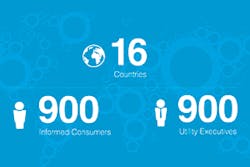Around the globe, economies are evolving, and more than ever, utilities are critical to economic prosperity. Unfortunately, utilities are in the midst of many pressing challenges. With booming populations, aging infrastructure and workforce, fixed utility asset bases, and looming government mandates, closely managing energy and water is becoming increasingly important. Utilities play a central role in the prosperity of national economies, serving as engines of commerce and enabling significant quality of life improvements. Now more than ever, utilities are tasked with being efficient and finding ways to be resourceful with what they have. Utilities and the services they provide impact every aspect of modern day life and their success will be determined by how effectively they manage the delivery and use of energy and water resources.
Resourcefulness Matters
Resourcefulness is not just about using less. It’s about finding new approaches to better managing energy and water. It includes identifying new and recoverable sources, implementing technology to reduce waste, and developing more efficient means of exploration and extraction. Ensuring that utilities maintain a role as economic engines involves investment in modernization of utility infrastructure. Nations that come to this realization and act upon it will be the success stories of the 21st century, since evidence suggests that countries benefit economically from making the investments needed to achieve a higher level of resourcefulness. Committing to strengthening resourcefulness can help countries lead and become even more competitive, and allow utilities to be more successful and have a positive impact, both on national economies and local communities.
The Resourcefulness Index
To expand resourcefulness, the industry needs to take a close look at where utilities are managed effectively and where there are areas for improvement. To this end, in February 2015, Itron launched its second annual Itron Resourcefulness Index (http://bit.ly/MpIvXT), a global study and benchmark of the state of resourcefulness with a specific focus on examining the ability of utilities to effectively manage the delivery and use of gas, water, and electricity.
This year, in addition to the perception survey, the Itron Resourcefulness Index also included Energy and Water Resourcefulness Indices. These indices compiled macroeconomic data from third-party sources, such as a country’s ranking in the World Bank’s Ease of Doing Business, World Economic Forum, Global Water Intelligence, and the International Energy Agency’s consumption statistics. The resulting indices are organized into three pillars—fundamentals, efficiency, and innovation—that influence overall resourcefulness for energy and water:
- Fundamentals reflect the ability of utilities to serve customers and the broader enabling environment;
- Efficiency measures the extent to which water and energy is wasted by utilities and consumers; and,
- Innovation captures the extent to which utilities are embracing new and emerging technologies.
The Itron Resourcefulness Index provides a broader assessment of the relationships between resourcefulness and economic health and global competitiveness.
What We Learned
Among the 16 countries surveyed, the top five water resourceful countries across utility fundamentals, efficiency, and innovation were Australia, Canada, Japan, United Kingdom, and Germany.
- Australia is the leading country in water resourcefulness. The country performs strongly across all three pillars and is ranked the strongest in efficiency as a result of having the largest meter market per capita and low proportion of non-revenue water. It also ranks highest in innovation, a result of government investment in environmental research and development (R&D).
- Canada performs very strongly across all pillars, with the highest fundamentals score and second highest innovation score. Canada maximizes its ample water resources by harnessing hydropower to generate approximately 60% of its electricity.
- Japan’s excellent fundamentals performance is driven by good scores in doing business, water and wastewater coverage indicators, as well as on survey indicators.
- The United Kingdom excels in the fundamentals and efficiency pillars due to waste and wastewater coverage rates.
- Germany performs well across all pillars; however, it has room for improvement in regards to environmental R&D investment.
As a part of the Index, Itron also conducted a perception survey in 16 key markets around the globe to gauge their outlook on the industry and priorities moving forward. A total of 1,820 surveys were completed by 902 utility executives and 918 consumers from around the world.
Key findings from the perception survey include:
- An awareness that the industry must continue modernizing infrastructure through investments in utility infrastructure and business intelligence/analytics in order to strengthen resourcefulness. This need for transformation is widely recognized—83% of utility executives feel it is needed, 55% believe the industry is not running efficiently and 21% believe the state of infrastructure will be worse in five years.
- Educating the public and attracting future employees need to be priorities for utility executives, as evidenced by the growing disconnect between utilities and consumers regarding consumer education and what information is wanted/needed. Among consumers, 54% believe there is a lack of consumerinformation about consumption and conservation despite 66% of utility executives believing they have been successful in engaging with consumers.
- Utilities should begin laying the groundwork for a future-proof business model in order to face a changing landscape that includes renewable energy integration, an aging workforce, Internet of Things adoption and dealing with massive amounts of data. A total of 64% of surveyed consumers reported that they would like the utility industry to focus on renewable integration.
How to Make it Actionable
Committing to strengthening resourcefulness can help countries lead and become even more competitive, contributing to a positive impact both on national economies and local communities. Utilities have the unique opportunity to drive resourcefulness by reinvesting in technology and solutions to further reduce waste, revitalize infrastructure, enhance network reliability, and improve consumer service. The Itron Resourcefulness Index demonstrates that the industry needs to do more to make the case for continued innovation and additional investment. There is a need for utility transformation. By modernizing aging infrastructure and changing the way utilities do business, utilities can improve a country’s competitiveness in the global economy by creating jobs and improving lives.
